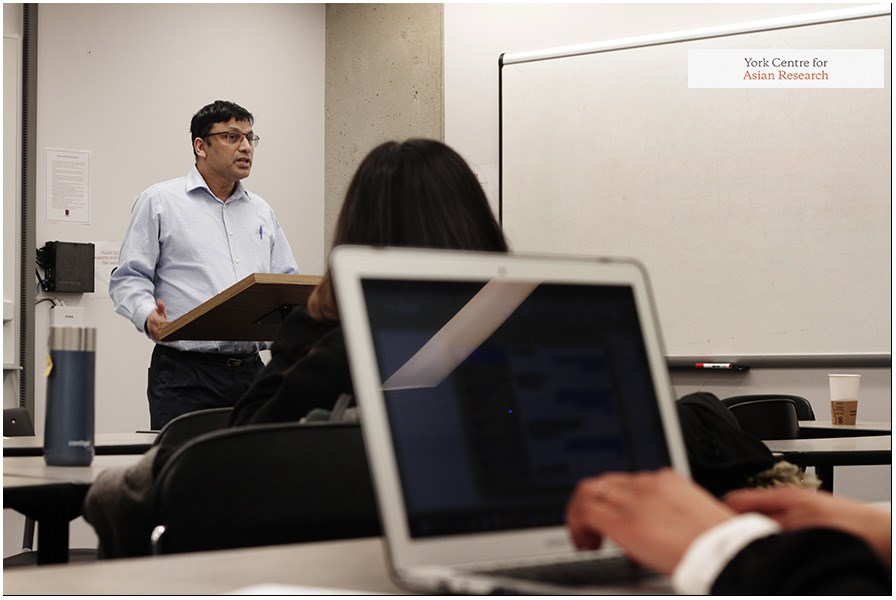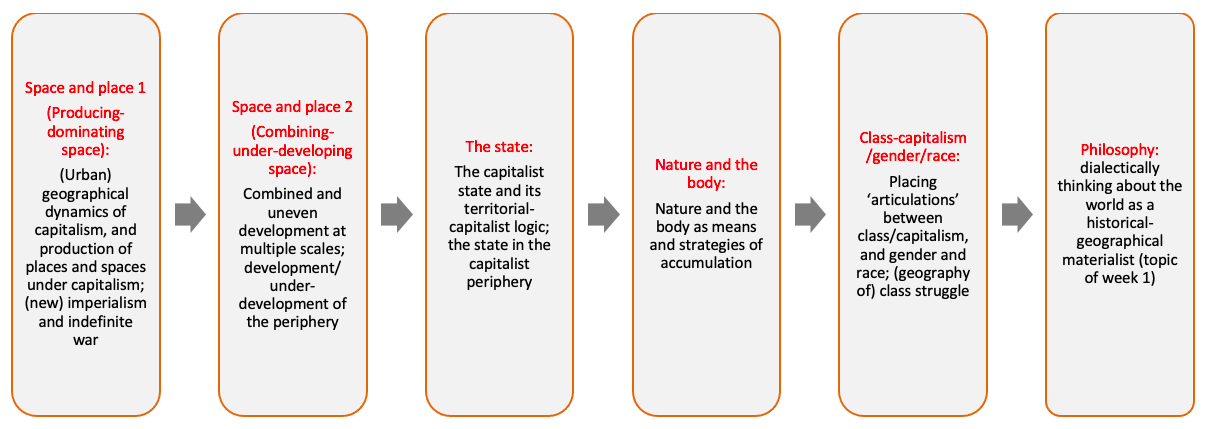
I teach courses on Marxist political economy, international development, global economy, state-society/economy relations, geographical organization of human society, and social/class struggles.
International Development
This third-year undergraduate course introduces students to the various debates on international development within geography and allied disciplines. Taking a geographically-inflected political economy approach, it also provides a wide-ranging discussion on specific issues and problems of development. These include: economic growth, poverty, unemployment, environmental degradation, agrarian relations and conditions, industrial transformation, rural-urban inequality, gender relations, and impacts of globalization/imperialism, in the context of the less developed world. These are dealt with both conceptually and empirically, at multiple spatial scales.
The course encourages students to consider the (geographical) development discourse partly as critical materialist political economy. It invites them to examine the ways in which this discourse is constructed through the use of fundamental concepts whose scope of application covers but also transcends development issues. It urges students to think about the less developed world not (just) in terms of low income but in terms of its more fundamental causative traits: the burden of imperialism, undemocratic social relations including feudal vestiges, and the exploitative relations between capital and labour. It promotes an understanding of the less developed world in terms of how its different regions interact among themselves and with the advanced world.
The State, Civil Society and Development
This fourth-year undergraduate course critically investigates the historically and geographically changing developmental role of both the state and civil society, theoretically and empirically. By systematically investigating these themes, the course invites students to critically think about the on-going reification of civil society and of issue-based protest politics, and to interrogate the current obsessions with the local-scale development and the minimalist state. It encourages students to critically think about the state as well as civil society and protest politics as purported solutions to problems of society.
South Asia
This course for third-year undergraduates is an introduction to some of the essential economic and political and ecological attributes of South Asia (SA). It aims to promote critical and conceptually-informed empirical understanding of South Asia as a world-region with its social and geographical unevenness. The course deals with SA’s physical environment and the resource base as well as its colonial history. It discusses its major economic and political issues. Major themes of the course include rural and urban-industrial transformation, human development and spatial and social inequality, environmental challenges, nature of state power, the politics of religious identity and the attendant turn to authoritarianism from above and from below, and popular movements for a better life. The course treats South Asia as a site of general processes that drive social and environmental changes elsewhere, and in terms of its own specificities. Its specificities are products of: its own unique internal economic-political evolution and its physical environmental context; its distinctive historical and contemporary linkages to other parts of the world including the diaspora, and the uncommon ways in which general processes that exist in other regions and at the scale of the world-market are expressed in SA.
Global Economy
This is a third-year undergraduate course about the nature of the contemporary global economy. Economic processes—especially processes in which wealth is produced and distributed—occur at the sub-national and national scales as well as at the scale of the world economy. The focus of this course is on the world economy. It is examined “not as a sum of national parts but as a mighty and independent reality which has been created by the international division of labour and the world market, and which in our epoch imperiously dominates the national markets” (Leon Trotsky). The course has three parts. Part 1 deals with the ongoing and exciting conceptual debate on economic globalization. Part 2 discusses the economic-geographical aspects of globalization, including international trade, trans-national production, mobility of financial capital, and cross-border migration of people. In part 3, we critically investigate the economic, environmental and social-class impacts of globalization. In particular, we examine how economic globalization affects the prospects for economic development and well-being in both rich and poor countries as well as its impacts on people’s working lives. The connection between globalization and imperialism is also explored.
Introduction to Geography
In this team-taught course for first-year undergraduate students, my section spanning over eight weeks aims to introduce geographical imagination which emphasizes the role of place, space and scale in the organization of human society. The section presents fundamental principles governing global human society, the principles that, more or less, apply to the various world-regions. These principles concern:
- Nature of class society and capitalism;
- Globalization of economy and its effects on different classes and regions;
- Food production and the pandemic in the capitalist world;
- Industrialization, its geography and political-economy;
- Geographically uneven development at the international and intra-national scales.
Space, Place and Capitalism: Themes in Historical-Geographical Marxism
This is a graduate course on Marxist political economy that is mounted in the graduate program in Geography and cross-listed with Environmental Studies and Sociology.
The course is a basic introduction to some of the key ideas in Marxist Theory. Standing on three intellectual foundations (dialectical-materialist philosophy, historical-materialist social theory, and political economy), Marxist theory is an organic whole. The course reflects that organic whole.
The course has two parts. Part 1 deals with some of the main themes of Marx’s Capital vol. 1 (as represented in the diagram below) in the first six weeks.

In Part 2, the course deals with the concepts that Marx did not deal with explicitly or in much detail in Capital Vol 1 (or indeed elsewhere) in the next six weeks. These topics are as shown in the following diagram.

Graphics by Raju Das

